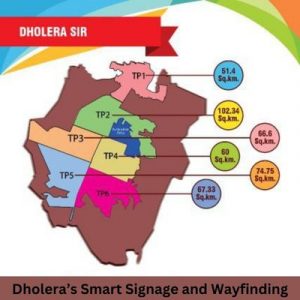Sustainable urban development requires effective waste management, and Dholera, an upcoming smart city in Gujarat, India, is setting the standard with creative approaches. This blog article examines how Dholera is reinventing sustainability and trash management.
The Vision of Dholera
Future cities are expected to follow Dholera‘s lead, with the goal of limiting their negative effects on the environment while maintaining a good standard of living for its citizens. This goal is demonstrated by the city’s waste management strategy, which emphasizes cutting trash production, encouraging recycling, and making use of cutting-edge technologies.
Reducing Waste at the Source
One of the key strategies in Dholera‘s waste management plan is to reduce waste at its source. This involves:
Public Awareness Campaigns: Educating citizens about the importance of waste reduction and how they can contribute.
Sustainable Packaging: Encouraging businesses to use biodegradable or recyclable packaging.
Composting: Promoting home composting to reduce organic waste.
Segregation and Recycling
Dholera has implemented a robust waste segregation system that separates waste at the household level. This segregation facilitates efficient recycling and processing:
Colour-Coded Bins: Residents use different coloured bins for organic, recyclable, and non-recyclable waste.
Recycling Centers: The city has established numerous recycling centres to process materials like paper, glass, and plastic.
Partnerships with Recyclers: Dholera collaborates with private recycling companies to ensure materials are reused effectively.
Advanced Waste Processing Technologies
To manage non-recyclable waste, Dholera employs cutting-edge technologies:
Waste-to-Energy Plants: These plants convert waste into electricity, reducing landfill usage and generating clean energy.
Biogas Facilities: Organic waste is processed in biogas plants, producing fuel for cooking and heating.
Material Recovery Facilities (MRFs): MRFs recover materials from mixed waste streams, further enhancing recycling efforts.
Sustainable Landfill Management
For waste that cannot be recycled or converted into energy, Dholera sir uses sustainable landfill practices:
Engineered Landfills: These landfills are designed to prevent soil and water contamination.
Methane Capture: Methane produced in landfills is captured and used as a renewable energy source.
Landfill Mining: Old landfills are mined to recover materials and reduce waste volume.
Community Engagement
Community participation is crucial for the success of waste management programs. Dholera engages its residents through:
Volunteer Programs: Residents can volunteer for clean-up drives and awareness programs.
Incentive Schemes: Incentives are provided for households and businesses that excel in waste management practices.
Feedback Mechanisms: The city has established channels for residents to provide feedback on waste management services.
Challenges and Future Directions
Despite its successes, Dholera faces challenges such as:
Behavioural Change: Encouraging long-term behavioural change among residents remains a challenge.
Technological Upgrades: Keeping up with the latest waste management technologies requires continuous investment.
Scalability: As the city grows, scaling up waste management systems to accommodate more residents is essential.
Dholera’s waste management approach is a dynamic and evolving process. The city is committed to continuous improvement and innovation, aiming to become a zero-waste city in the future.
Conclusion
Dholera‘s approach to waste management is a blueprint for other cities to follow. By integrating public participation, advanced technologies, and sustainable practices, Dholera is not just managing waste but transforming it into a resource that benefits the community and the environment.




